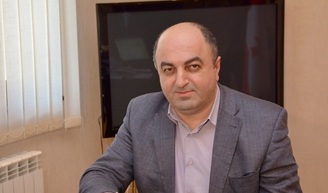Natia Gogolashvili
On November 16, Public Defender of Georgia traditionally marked the International Tolerance Day. The event was organized by the Tolerance Center under auspices of the Public Defender’s Office of Georgia in the frame of the USAID funded project of the United Nations Association of Georgia - "Promoting Integration, Tolerance and Awareness" (PITA).
Representatives of the state institutions, diplomatic missions, international and nongovernmental organizations, media, councils of religion and ethnic minorities attended the event.
Public Defender Ucha Nanuashvili opened the celebration event. In his speech, the Ombudsman spoke about all those problematic issues, which are related with intolerance in Georgia. He also underlined the recent positive tendencies.
According to the Public Defender’s evaluation, the number of violence offences, which were committed on the basis of religious intolerance, has significantly reduced. According to his information, in 2017 their office received only three applications about religious intolerance facts. However, as Ucha Nanuashvili said, problem still exists with regard to adequate responses to the violence facts, which occurred in the past.
“Majority of past cases are still uninvestigated. The issue of restitution the places of worship to the religious groups is still unresolved problem. Public Defender has been requesting equal tax policy for all religious groups too. Besides those five religious unions, towards whom the state demonstrated kind will and recognized them to be victims of soviet repressions, the state shall demonstrate the same attitude towards other religious groups too,” Ucha Nanuashvili said.
According to the Public Defender’s evaluation, this year, the so-called Mokhe commission acting under the mandate of the State Agency for Religious Issues, made very problematic decision. “The commission failed to estimate origin of historical mosque in Mokhe. Unfortunately, we could not receive any results from the work of this commission. Consequently, the Mokhe mosque was not restituted to the local muslim community. Instead, they offered them to build a new mosque in other territory in the same village,” the ombudsman said.
He added that representatives of religious minorities have limited their right to construct places of worship.
“Regardless the court judgment, the Rustavi Catholic Church was not allowed to construct a church on its territory. The state offered another territory for the construction in the same city. This year, the construction of the new mosque in Batumi is still a problem. Local muslim people encounter many problems there,” the Public Defender said.
According to the ombudsman, the discussion about restriction of freedom of religious in the process of constitutional amendments developed quite interestingly.
“Freedom of religion was not mentioned at all alongside the freedom of faith in the draft version presented by the constitution commission. However, as a result of our joint recommendations together with the Council of Religions and nongovernmental and international organizations, the freedom of religion was restored in the constitution but afterwards during the first hearing of the constitutional amendments a list of restrictions of freedom of religion appeared there. Among them were the conditions which are not respected by basic international documents on human rights and western constitutional traditions. As a result of recommendations, the parliamentary majority declared they plan to correct the criteria on the restriction of freedom of religion in already adopted constitution through new amendments. We positively evaluate their decision,” the Public Defender said.
The councils of ethnic minorities and religions under auspices of the Public Defender’s Office, traditionally nominated and awarded the tolerance defenders. The councils make decisions independently. The tolerance defenders were nominated in the following categories: organization, individual, public servant and media organization.
The 2017 tolerance defenders are: writer Lasha Bughadze, organizer of the festival Under Common Sky and musician and honored teacher Manana Alpaidze; Peace, Democracy and Development Caucasian Institute became the tolerance defender among the nominee organizations for the project Religions Club and Artarea for the project Tbilisi Yard; TV-Company Rustavi 2 and newspaper Gurjistan were winners among media organizations; from public servants – chairperson of the Republic Party Khatuna Samnidze, MP Giga Bokeria and advisor of the Prime Minister Guram Odisharia. Honorable awards were assigned to the Episcope of the Evangelist Lutheran Church Hans Joahim Kiderlan and head of the Czech association Zlata Prague Garold Shamltsel.
The winners of the media competition about the International Tolerance Day were awarded with special prizes of the Public Defender. Since 2006, the PDO has been announcing competitions for journalists to encourage journalists reporting on diversity and tolerance. The head of the Tolerance Center Beka Mindiashvili said it may be declared that the initiative of the Public Defender had positive impact because more and more journalistic publications about diversity are published in Georgian media. Besides that, use of hate speech and stereotypes has reduced in the main media.
Journalists of the magazine Samkhretis Karibtche Nino Narimanishvili and Tinatin Zazadze received the first and third prizes in the media competition. The article which received the first prize was about the repatriation of Muslim Meskhs – “Complicated Way to Return to Homeland.” The third-place winner article is “Places of Worship Which Became Warehouses” about the state of mosques and jamehs in the Georgian villages. Editor of the magazine Liberali Zura Vardiashvili took the second place for the article: “What the mother history teaches us.”
The International Day for Tolerance was established in 1996 by the UN General Assembly. As the Ombudsman’s office reported, the International Day for Tolerance is marked annually to memorize the respect between cultures and civilizations, to remind the need of dialogue and mutual cooperation.
News
December 13, 2023
Ethnic minorities outside the peace dialogue
November 6, 2023
‘Peace’ agenda of political parties
Popular
Articles
February 13, 2024




